Can chickens eat swiss chard? The short answer is yes! Swiss chard is an excellent source of vitamins A, C, and K, as well as iron, potassium, magnesium, calcium, zinc, and manganese. These nutrients are necessary for maintaining optimal health in chickens.
Additionally, swiss chard has high water content – up to 95% – which helps keep chickens hydrated during hot summer months. This leafy green also contains dietary fiber, which helps regulate digestion in chickens.
While swiss chard is a nutritious treat for chickens, it is important to feed them in moderation. Too much of this leafy green can cause an imbalance in the nutrients in the chickens’ diets, leading to health issues. This article will cover the benefits of feeding your chickens swiss chard, how to prepare it for them, and how much they should be given.
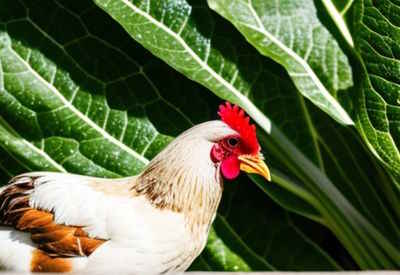
Can chickens eat swiss chard?
If you’re looking for a way to provide your chickens with some extra nutrients and hydration, swiss chard may be the answer you’ve been looking for. It’s packed with vitamins and minerals essential for keeping your chickens healthy and strong.
The best way to feed swiss chard to your chickens is by chopping it into small pieces before giving it to them. You can also mix it in with other foods like pellets or grains so that they get used to the taste and texture of the leaves.
Just be sure not to overdo it; while swiss chard is safe for chickens in moderation, too much can cause digestive issues like diarrhea or vomiting.
[ChickenAffiliate]
The benefits of eating swiss chard for chickens
Swiss chard is packed with vitamins and minerals, making it an excellent addition to your chicken’s diet. Here, we will discuss five important benefits of feeding swiss chard to your chickens.
Vitamin A
One of the most important benefits of feeding swiss chard to your chickens is that it contains high levels of vitamin A. Vitamin A helps keep the eyes and skin healthy and can help boost their immune systems. Chicken owners should ensure their flock gets enough vitamin A in their diets, as deficiencies can have serious health consequences.
In addition to containing vitamin A, swiss chard is also full of other essential vitamins and minerals such as vitamin C and calcium. These vitamins can help promote overall health in chickens, especially during the molting season when they need extra nutrition to grow new feathers.
Digestive Health
Swiss chard contains dietary fiber, which helps support digestive health in chickens by aiding in regular digestion and absorption of nutrients from food. This means chickens can get more out of their food than eating grains alone.
Additionally, dietary fiber helps keep the gut healthy by reducing inflammation which can lead to other problems like diarrhea or constipation in chickens.
Healthy Egg Production
Swiss chard contains various nutrients essential for healthy egg production, such as iron, zinc, and magnesium. Iron helps the body produce red blood cells, which carry oxygen throughout the body. This is important for keeping energy levels up so that chickens can lay eggs regularly without experiencing fatigue or stress.
Zinc helps regulate hormone levels which play an important role in egg production. Magnesium helps regulate calcium levels which keeps bones strong and healthy so that hens have no difficulty laying eggs whenever needed.
Taste Variety
Another benefit of adding swiss chard into your chicken’s diet is that it adds some much-needed flavor variety into their diets! Chickens are naturally curious creatures who love exploring new tastes and textures. Providing them with various foods like swiss chard will give them something new to explore every day, so they don’t get bored with their meals.
Plus, it’s a great way to get them to try different veggies.
Affordable Option
Finally, one last benefit of adding swiss chard to your chicken’s diet is that it is affordable. If you already have a garden, you may already be growing swiss chard, or you could easily start growing some on your own. Either way, it won’t cost much compared to buying bagged feed from the store every time you need more for your flock.
Plus, if you have leftovers after feeding your chickens, you can use them yourself, too – win-win!
Things to watch out for when feeding swiss chard to chickens
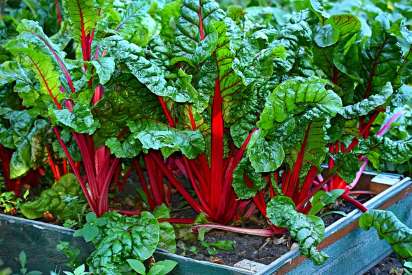
Before you start feeding your chickens swiss chard, there are a few things you should know. Read on to learn the three most important things to watch out for when feeding swiss chard to chickens.
Feed in Moderation
The first thing you must remember is that swiss chard should be fed to chickens in moderation. Too much of this leafy green can cause digestive issues, such as diarrhea.
If your chickens seem uninterested in the food, don’t force them to eat it. You don’t want your chickens getting sick because of an overabundance of greens.
Watch For Pesticides
When purchasing swiss chard for your chickens, check the label for any pesticides or other chemicals that may have been used on it. You want to ensure these chemicals won’t harm your chickens before giving them the food.
Additionally, you should always wash the leaves thoroughly before feeding them as an extra precaution against potential contaminants.
High Water and Fiber Content
Finally, you should know how much water and fiber are in the leaves. Swiss chard has high levels of water and fiber, which can cause digestive issues in some chickens if they eat too much of it at once.
To avoid this problem, feed only small amounts at a time so that their digestive systems can handle the influx of water and fiber without becoming overwhelmed.
How often should chickens eat swiss chard?
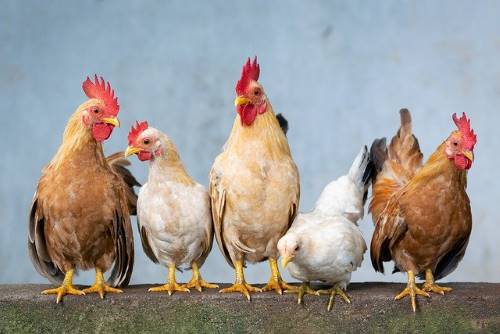
When it comes to swiss chard, moderation is key. It’s a great source of nutrition for chickens, so they can occasionally benefit from snacking on it. It’s best not to make swiss chard a regular part of their diet.
No more than 10% of their daily food intake should be swiss chard or other greens. That way, your feathered friends get the most out of all the different foods you give them, and you can ensure that their diet is balanced and nutritious.
How to prepare swiss chard for feeding to chickens
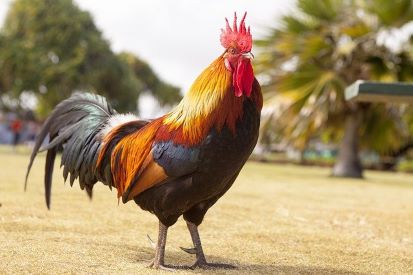
Vegetables are an important part of a chicken’s diet, and Swiss chard is one of the best vegetables you can give them. But before you do, you must ensure it’s prepared correctly. Let’s look at how to prepare swiss chard for feeding chickens.
Wash First
Chickens are naturally messy animals and can carry bacteria from the ground, so it’s essential to start by washing the swiss chard thoroughly.
Fill up a bowl with cold water, add some salt or vinegar if necessary and put the swiss chard in there. Swish it around until all the dirt and other bits have been removed, then take it out and drain it on kitchen paper or in a colander.
Chop Into Small Pieces
Once washed, chop up the swiss chard into smaller pieces so that your hens can eat it easier. This will also help them digest it more quickly and encourage them to eat more of it compared to larger chunks that they may struggle with.
You want small enough pieces they won’t choke on but also big enough that they don’t swallow it whole without tasting it.
Can Cook First If Easier
Depending on what type of swiss chard you have, cooking first may be easier for your chickens to digest if it has thick stems or leaves.
To cook it, steam or boil it in water until soft, then chop as above once cooled down. Steaming is preferred as it keeps most of its nutrients intact compared with boiling, where some can escape.
Remove Any Uneaten Pieces
Once you feed the swiss chard to your chickens, ensure you remove any uneaten pieces – this will prevent any bacteria from growing on them, which could cause health problems for your birds later down the line.
Can baby chicks eat swiss chard?
Baby chicks can eat swiss chard, though it is not recommended as their primary food source. A little bit is safe and can provide beneficial vitamins and minerals, but it should be kept in moderation.
When feeding baby chicks swiss chard in small portions, monitor their activity carefully and look for any signs of distress such as vomiting or dehydration. Additionally, always ensure that fresh water is available for the chicks to drink.
What other leafy greens can chickens eat?
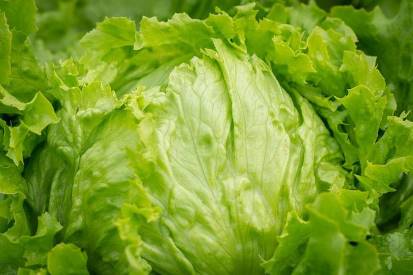
You may wonder what other leafy greens you can feed your chickens besides swiss chard. After all, a well-rounded diet is essential to keeping your chickens healthy and happy. Fortunately, you can offer plenty of leafy greens to your flock to diversify their nutrition and keep them energized. Let’s take a look at some of the most popular options.
Lettuce
Lettuce is perhaps one of the most popular leafy green vegetables chickens love to eat. Whether it’s iceberg, romaine, or butterhead lettuce, your chickens will surely gobble it up. You can also mix different types of lettuce for added variety to their diet. Remove wilted leaves before feeding, as these could make your chickens sick.
Read More: Can Chickens Eat Lettuce? 4 Surprising Benefits
Spinach
Spinach is an excellent source of iron and vitamins A and C for your hens. It’s easy for them to digest and provides an important source of energy for laying eggs. To make it easier for your flock to consume spinach, you can cut it into small pieces or mash it up before feeding it.
Read More: Can Chickens Eat Spinach? 6 Important Benefits
Kale
Kale is packed with essential nutrients such as calcium, phosphorus, magnesium, potassium, and vitamin E that help support bone health in chickens. Kale also contains lutein which supports eye health in birds. As with any leafy green vegetable you offer your chickens, ensure you remove any wilted leaves before feeding.
Read More: Can Chickens Eat Kale? 5 Fantastic Benefits
Arugula
Arugula is another leafy green vegetable that your chickens will love. It’s high in iron which helps support the production of red blood cells in birds while also providing important antioxidants such as beta carotene and vitamin C, which help protect against disease and infection.
Read More: Can Chickens Eat Arugula? 5 Amazing Benefits
Collard Greens
Collard greens are a great source of dietary fiber for chickens which helps aid digestion and prevent constipation in birds. They’re also rich in vitamins A and C, which help support overall health in birds by boosting their immune system function and promoting healthy skin and feathers. When preparing collard greens for your flock, chop or mash them into smaller pieces, so they’re easier to consume.
Read More: Can Chickens Eat Collard Greens? 5 Excellent Benefits
Can chickens eat swiss chard – final thoughts
Feeding swiss chard to your chickens is a great way to add some variety to their diet while providing them with essential nutrients and hydration. However, ensure you only give them small amounts at a time since too much can be bad for their digestive system.
With these tips in mind, we hope you feel more confident about incorporating swiss chard into your chicken’s diet.
Related Articles:
